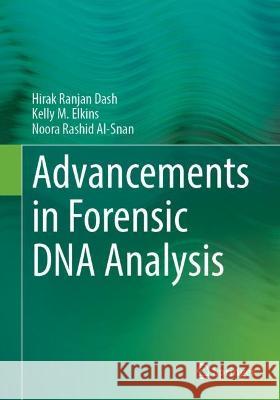Advancements in Forensic DNA Analysis » książka



Advancements in Forensic DNA Analysis
ISBN-13: 9789819961948 / Angielski
Advancements in Forensic DNA Analysis
ISBN-13: 9789819961948 / Angielski
(netto: 422,69 VAT: 5%)
Najniższa cena z 30 dni: 424,07
ok. 16-18 dni roboczych.
Darmowa dostawa!
Chapter 1_Current status and advancements of forensic DNA analysis. - Chapter 2_Use of advanced molecular techniques for human body-fluids detection. - Chapter 3_Technological advancements in DNA extraction and quantification of forensic samples. - Chapter 4_Advanced emerging techniques for forensic DNA analysis: STRs, mtDNA and SNPs. - Chapter 5_Fast, highly sensitive and high-resolution DNA techniques. - Chapter 6_Progressions in non-human DNA analysis. - Chapter 7_Applications of NGS technology in forensic DNA analysis. - Chapter 8_Advancements in statistical and probabilistic genotyping analyses for forensic applications. - Chapter 9_Role of forensic DNA databases in criminal identification. - Chapter 10_Guidelines, Ethical issues and other challenges of forensic DNA analysis. - Chapter 11_ Application of forensic DNA technology in analyzing real-time case work samples. - Chapter 12_Future directions of forensic DNA analysis.
Dr. Hirak Ranjan Dash is an Assistant Professor of Forensic Biology and Biotechnology at National Forensic Sciences University, India. Before joining academics, he has worked as a Forensic DNA expert at Forensic Science Laboratory, Madhya Pradesh, India. He has examined more than 1000 cases by DNA fingerprinting technique. His research interests include DNA fingerprinting, Microbial forensics, microbiome analysis, Next Generation Sequencing, and mtDNA analysis. He has published more than 40 research papers in various peer-reviewed journals. He has written 10 books in various fields of Biotechnology. He is a life member of International Society of Forensic Genetics, Association of Microbiologists of India, and Asian Federation of Biotechnology. He served as reviewer for PLOS One, Annals of Human Biology, Scientific Reports and several other journals. He is the pioneer worker from India on NGS based forensic DNA analysis. He has been featured in the list of world’s top 2% scientists.
Dr. Kelly Elkins is a Professor of Chemistry at Towson University where she teaches for the Masters of Science in Forensic Science degree in the Forensic Program and is the co-Director of the TU Human Remains Identification Laboratory. Previously, she was the Director of Forensic Science at Metropolitan State College of Denver. She has nearly twenty years’ experience in university teaching. She earned her B.S.in Biology and B.A. in Chemistry from Keene State College and her Ph.D. in Chemistry with an emphasis in Biochemistry from Clark University. She is a Fellow of the American Academy of Forensic Sciences and a member of the American Chemical Society. As a forensic science expert, she has published almost 70 book chapters and journal articles on her research in forensic DNA typing and drug analysis. She frequently speaks at national and international conferences and consults on forensic cases. This is her 7th book.
Dr. Noora R. Al-Snan is an enthusiastic DNA analyst who has joined Ministry of Interior (MOI), in General Directorate of Criminal Investigation and Forensic Science, FSL (Bahrain) in 2008 and currently assigned as the head of Biology & DNA Forensic Lab. In 2019, she has completed her PhD degree in molecular medicine specializing in medical genetics in the topic of DNA typing for the Bahraini population under the supervision of the Arabian Gulf University (AGU) with the cooperation of Naif Arab University for Security Sciences – NAUSS - (Riyadh, KSA). In 2012, she has received her MSc degree in medical biotechnology specializing in genetic engineering for recombinant proteins from Arabian Gulf University (AGU). She has completed a bachelor’s degree in molecular biology and biochemistry studies from Kuwait University (Kuwait). In her 16 years of forensic experience, she has analyzed and solved many challenging cases mainly related to terrorism, robbery and murder. Dr. Noora has joined many conferences and workshops as a speaker and delegated from MOI. She has achieved many outstanding results along with her team as obtained DNA hit of the year for the Bahrain bomb cases from Gordon Thomas Honeywell that was held in HIDS Conference in 2023. In addition, one of the published scientific papers was the most frequent downloaded paper in Molecular Genetics and Genomics. Also, she is a corresponding author for many scientific papers as well as authoring books with Springer and Elsevier. She has set innovative protocols regarding recovery of DNA from RDX-C4 evidence, Forensic DNA intelligence, fast and effective DNA extraction from teeth, bones and maggots and the effect of inbreeding marriages in familial searching. Her main interests are investing in human resources, continuous education, and R&D.
This textbook for undergraduate and postgraduate students discusses advancements in forensic DNA analysis since early texts were published. It presents conventional and latest serological and molecular biological methods for body fluid identification. This book also describes the applications and advantages of next-generation sequencing (NGS) compared to conventional methods in forensic DNA analysis. It also defines the growing importance, techniques, and applications for the analysis of non-human DNA in forensic sciences. Further, the book examines the role of DNA databases in forensic interpretation and criminal investigations. Towards the end, this textbook reviews the application of forensic DNA technology in analyzing real-time casework samples and presents the guidelines, ethical issues, and other challenges of forensic DNA analysis. This textbook is an essential resource for students and practitioners interested in gaining knowledge of up-to-date forensic techniques and their applications in forensic DNA analysis.
1997-2026 DolnySlask.com Agencja Internetowa
KrainaKsiazek.PL - Księgarnia Internetowa









